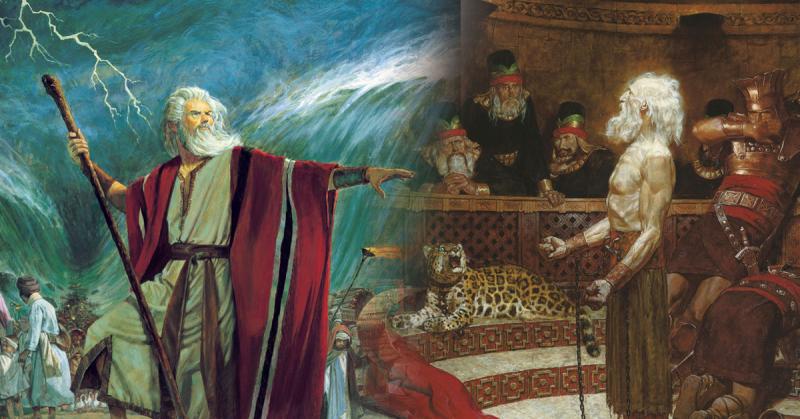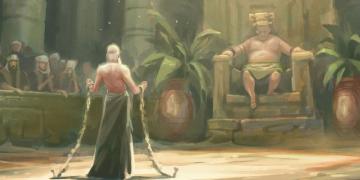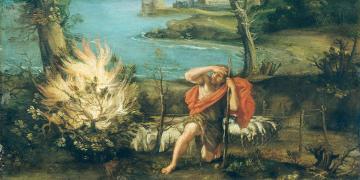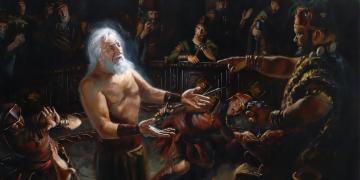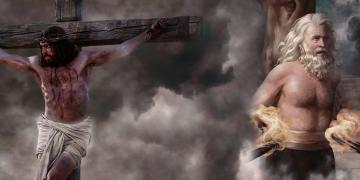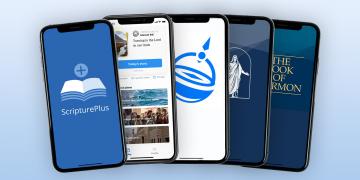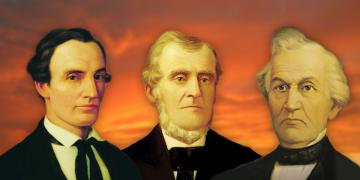You are here
Book of Mormon Central is in the process of migrating to our new Scripture Central website.
We ask for your patience during this transition. Over the coming weeks, all pages of bookofmormoncentral.org will be redirected to their corresponding page on scripturecentral.org, resulting in minimal disruption.
The story of Abinadi and the story of the Exodus are remarkably similar. From reciting the Ten Commandments, to faces shining with the power of God, Abinadi and Moses have a lot in common. These similarities can help us recognize God’s loyalty to His covenants, and can even help us learn about the Atonement of Jesus Christ.
1. Abinadi as a type of Moses
As mentioned above, Abinadi’s story imitates the saga of the Exodus in striking ways. First, Abinadi recalled the tragic events of the Exodus by prophesying that all the people would be brought into bondage. He proclaimed that the Lord would curse them with seven plagues unless they repented. (burdens, famine, pestilence, hail, east wind, insects, utter destruction; see Mosiah 12:4–8).
When Abinadi was imprisoned and bound before King Noah, he declared to the entire court the Ten Commandments with the power and authority of the great Old Testament prophet Moses. As he declared God’s law, Abinadi’s face “shone with exceeding luster, even as Moses’ did while in the mount of Sinai, while speaking with the Lord” (Mosiah 13:5). Then finally, in Mosiah 16 after Abinadi declared God’s word, with the power of the priesthood he “stretched forth his hand,” just as Moses stretched forth his hand to part the Red Sea.
There are many more parallels between Moses and Abinadi, and they can teach us about the Lord’s loyalty to His covenant people. Even when we fall away from God’s light, there is always hope. Through faith in the Lord, the ancient Israelites were delivered from their bondage. While the Nephites in this story were wicked, they eventually humbled themselves and repented. The Lord heard their cries, was true to His covenant, and delivered them out of the bondage of the Lamanites. No matter how far off the path we are, the Lord can always deliver us when we turn to Him.
See more parallels in the chart at the end of this post.
Further Reading
Book of Mormon Central. “Why Does the Book of Mosiah Refer to the Exodus Narrative? (Mosiah 11:27).” KnoWhy 516 (May 16, 2019).
Book of Mormon Central. “Why Did Abinadi Stretch Forth His Hand as He Prophesied? (Mosiah 16:1).” KnoWhy 94 (May 6, 2016).
Sara Riley, “‘Even as Moses’ Did’: The Use of the Exodus Narrative in Mosiah 11–18,” FairMormon presentation, 2018, online at fairmormon.org.
2. King Noah as a type of Pharaoh
The very beginning of Abinadi’s story starts with King Noah asking the question, “Who is Abinadi, that I and my people should be judged of him, or who is the Lord, that shall bring upon my people such great affliction?” (Mosiah 11:27). This is a striking echo of the pharaoh declaring in Exodus 5:2, “Who is the Lord, that I should obey his voice to let Israel go?”
Both King Noah and the Pharaoh in Exodus are oppressive, wicked kings who refuse to hearken to the message of the Lord. Neither king followed in the steps of their more righteous predecessors (Mosiah 11:1; Exodus 1:8). Both rulers caused the people to work on their extensive building project for them (Mosiah 11:6; Exodus 1:11). They are paranoid that the people will rise up in rebellion against them (Mosiah 18:33; Exodus 1:10). And finally, both rulers harden their hearts against the Lord (Mosiah 11:29; Exodus 9:12).
These similarities could go on, and they illustrate that history often repeats itself. Patterns of wickedness can be found in many leaders of history, and in leaders of today. We should always be careful and diligent in electing righteous leaders to protect the liberties and rights of all people.
Further Reading
Book of Mormon Central. “Why Does the Book of Mosiah Refer to the Exodus Narrative? (Mosiah 11:27).” KnoWhy 516 (May 16, 2019).
Sara Riley, “‘Even as Moses’ Did’: The Use of the Exodus Narrative in Mosiah 11–18,” FairMormon presentation, 2018, online at fairmormon.org.
3. Nephite Festivals Commemorating the Exodus
Abinadi’s setting even alluded to the Exodus, since there is evidence that Abinadi may have been prophesying during the Israelite festival of Pentecost, or Shavuot. This Israelite festival occurred fifty days after Passover, and commemorated Moses receiving the Law of Moses on Mount Sinai. The people would gather to the temple and celebrate their deliverance from bondage in Egypt.
Abinadi used this occasion to his advantage by preaching repentance to the people, while drawing on the themes of this celebration. Abinadi recited the Ten Commandments to King Noah and his court, just as Moses gave the Ten Commandments to the Israelites. The festival of Pentecost was three days long (see Exodus 19:11), which may explain why Abinadi’s trial was postponed for three days. Abinadi also drew on Psalms 50 and 81, which were likely sung during Pentecost.
Abinadi’s preaching at Pentecost allowed him to reach a lot of people at once, and highlighted the irony of the Nephite situation. While they were celebrating the Law of Moses and God’s favor, Abinadi declared that God would curse them for their wickedness, and that they did not live the Law of Moses the way they should.
Further Reading
Book of Mormon Central. “Did Abinadi Prophesy During Pentecost? (Mosiah 13:5).” KnoWhy 90 (May 2, 2016).
John W. Welch, Gordon C. Thomasson, and Robert F. Smith, “Abinadi and Pentecost,” in Reexploring the Book of Mormon, John W. Welch ed. (Provo, UT/Salt Lake City: FARMS/Deseret Book, 1992), 135–138.
John W. Welch, “The Trial of Abinadi,” in The Legal Cases in the Book of Mormon (Provo, UT: BYU Press/Neal A. Maxwell Institute for Religious Scholarship, 2008), 139–210.
4. Abinadi and Moses and types of Christ
Perhaps the most moving parallel from the Abinadi story is how Abinadi, like Moses, is a type of Christ. Abinadi, perhaps more than any other Book of Mormon prophet, could personally relate to Christ’s mission and suffering.
When the priests of King Noah questioned Abinadi on the meaning of Isaiah, Abinadi recited from memory Isaiah 53, which contains stirring and poignant prophecies that can be likened to Jesus Christ’s suffering.
Both Abinadi and Jesus Christ would experience similar trials, as Isaiah prophesied. They would both be despised and rejected of men, a man of sorrows, acquainted with grief, stricken, smitten of God, and afflicted. They would both be wounded for people’s transgressions, brought as a lamb to the slaughter and cut off out of the land of the living.
Abinadi might have been consoled in the knowledge that though he suffered rejection and persecution, the Savior would descend below all things. Not only that, Abinadi’s suffering brought redemption for generations after him. Because Abinadi was martyred, Alma the Elder recorded his message and spread the gospel to hundreds of Nephites. We owe a debt of gratitude to Alma for preserving Abinadi’s tragic experience so that we can experience true conversion. One might even say that by Abinadi’s wounds, we are healed by the gospel of Jesus Christ.
Further Reading
Book of Mormon Central. “Why Did Abinadi Talk About the Suffering Messiah? (Mosiah 14:4).” KnoWhy 91 (May 3, 2016).
Book of Mormon Central. “Why Would Noah’s Priests Quiz Abinadi on Isaiah? (Mosiah 12:20–21).” KnoWhy 89 (2016).
Appendix: Chart of Parallels between the Exodus and the Abinadi narrative
|
Moses Narrative in Exodus |
Abinadi Narrative in Mosiah |
|
Oppressive Pharaoh |
Oppressive & wicked King Noah |
|
Moses kills an Egyptian, and flees to Midian |
Abinadi prophesies and flees the people |
|
Moses is commanded to return and to deliver Israel |
Abinadi is commanded to return and prophesy |
|
Moses is sent to free the Israelites from bondage |
Abinadi prophesies that unless the people repent, they will come under bondage |
|
Mosees prophesies of seven plagues |
Abinadi prophesies of seven plagues (12:4–8) |
|
Moses & Aaron compete against Pharaoh’s court priests |
Abinadi withstands King Noah’s priests |
|
Moses received the Ten Commandments |
Abinadi recited the Ten Commandments |
|
Moses’ face shone brilliantly after receiving the Law from Mount Sinai |
Abinadi’s face shone with “exceeding luster” while preaching the Law to Noah’s priests (13:5) |
|
Moses stretched forth his hand to afflict the Egyptians and part the Red Sea |
Abinadi stretched forth his hand to declare God’s will to King Noah and his priests (12:2; 16:1) |
|
There arose a new pharaoh that knew not Joseph (1:8) |
King Noah did not walk in the ways of his father (11:1) |
|
Israelites built “treasure cities,” and “their lives bitter with hard bondage.” (1:11–14) |
The people labored hard to support King Noah, and his building projects (11:6–13) |
|
Pharaoh: “Who is the Lord, that I should obey his voice?” (5:2) |
King Noah: “Who is Abinadi, that I and my people should be judged of him, or who is the Lord, that shall bring upon my people such great affliction.” (11:27) |
|
Pharaoh hardened his heart (9:12) |
King Noah hardened his heart (Mosiah 11:29) |
|
The firstborn in Egypt die, Israelites leave Egypt |
Abinadi is executed; Alma escapes |
|
Israelites pass through the Red Sea |
Alma’s followers are baptized |
|
Israelites wander in the wilderness |
Alma’s people flee into the wilderness |
|
Moses instructs the people & gives laws |
Alma organizes & instructs his followers |
|
The Lord chastens the Israelites |
The Lord tries the faith of the Nephites/bondage |
|
Israelites have many deliverances |
The Lord delivers the people from the Lamanites |
|
Israelites arrive to the Promised Land |
Alma & his people arrive in Zarahemla |
|
Israelites begin to establish cities |
Alma is authorized to organize the church of God |
Subscribe
Get the latest updates on Book of Mormon topics and research for free


